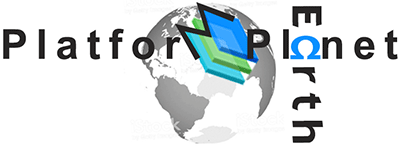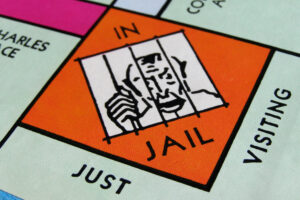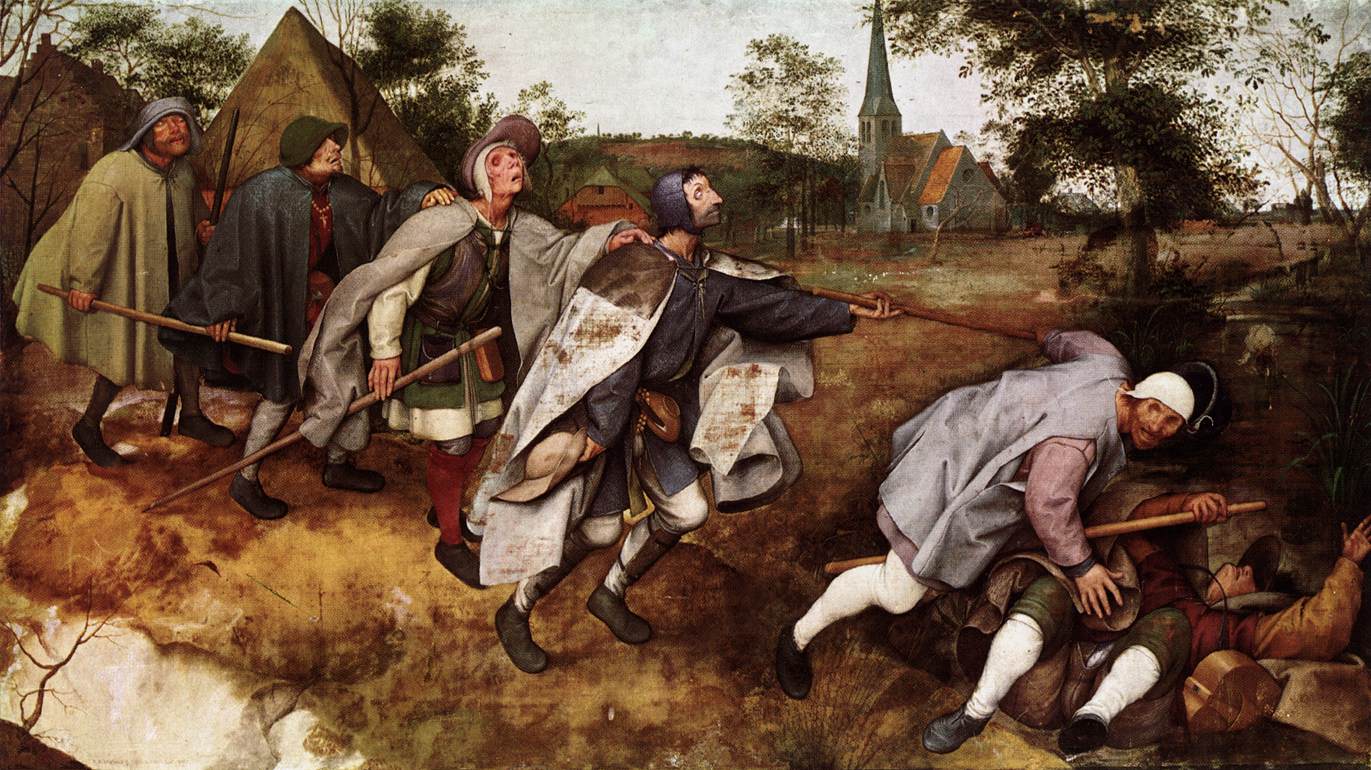The Monopoly Prison8 min read
Leestijd: 6 minutenAmerican writer and social philopher Henry David Thoreau made a critical assumption that typically captures the predicament of our time period, the antroposcene, marking the dominion of mankind.
“As if you could kill time without injuring eternity”.
Henry David Thoreau
It is quite confronting in its simple truth really. Yet it captures the very essence of what we are doing: ‘we are killing time. Our time. And it is running out’.
What we do now or choose not to do, determines our future. This article argues if we feel able to even making that choice. Or are we imprisoned by the system we created, caught up in our monopoly prison? Frozen within our short-terminism.
Becoming aware of our place in time
Just as small children devellop their sence of time and become able to think further ahead as they grow older, we as a species slowly develloped our sense of time since we started walking upright and made our way as hunter gatherers.
Yet early man had no real sence of the distant future and was mostly living in an “extended form of present”. Busy surviving to see the end of day (Fisher).
Just like children growing up, our understanding and awareness of deep time and our relatively short part in this ‘stage play of the universe’ develloped over the centuries.
“All we are is dust in the wind”, as the band Kansas poetically wordpainted its classic progressive rock masterpiece.
With the dawn of the early 18th century, many philophers, writers, geologists and scientists emerged with works displaying a strong belief in progress. It was the result of the period of enlightenment, the age of reason. It paved the way in our awareness of ourselves and as a species offering us a greater understanding of our planet. Humankind was pushing forward in a strong belief in the future.
However, in one of his major books ‘Regimes of Historicity’, french historian François Hartog identifies certain periods of crisis, like the french revolution, or the first world war in which the views of people shortened to more near-term perspectives. It is of course quite logical. In times of crisis we tend to crawl back and shorten our steps. This corona period is a perfect example of exactly that.
Yet, as BBC’s editor in chief Richard Fisher points out, “unlike other animals, we have minds capable of imagining a deep future, and we can conceive the daunting truth that our lifetime is a mere flash in an unfathomable chronology. Yet, while we have this ability, it is rarely deployed in daily life.” (Fisher)
All caught up
We are all caught up in an collective failure to escape our present moment. This new period of ‘presentism’ started somewhere in the late 1980’s when neo- liberism and market influence grew under the reign of Thatcher and Ronald Reagan.
François Hartog defines ‘presentism’ as “the sense that only the present exists, a present that is characterized by the tyranny of the instant and by the treadmill of an unending now.”
When stating that we are caught up in this period of time, there are also other voices that foster progress. In comparison to our recent past of roughly a century ago -we have never had so much celebrated progress according to writers as Stephen Pinker or Charles Groenehuijsen. It would suggest that instead of looking forward in fear, we should instead embrace the future with confidence. All because of our accomplishments thus far and the enormous potential of our exponential technical knowledge. And this is true ofcourse.
But somehow in reading their work, these positive messages irratated me. Some things are just not adding up.
It motivated me in writing this article because I felt the urge to follow the example of Marja de Vries ‘s brilliant book “the entire elephant in view”, zooming out to get a clearer picture of what is actually eating us. Although this actually would take a book to do right for the subject at hand.
In ‘Enlightenment Now’, Pinker argues that certain values of enlightenment, like reason, science, and humanism have brought us great progress. Prooving through large amounts of data that health, prosperity, safety, peace, and happiness have tended to rise worldwide.
Former correspondent and journalist Charles Groenhuijsen follows more or less the same track as Pinker. In his book ‘Optimists own the world’, he offers a hopefull perspective, by arguing that thanks to optimism, technology and vigor, humankind can and will overcome the challenges that lie ahead.
These books display a crucial need for positivty. They offer a way to look ahead and see a bright future ahead of us. However they also turn a willfull blind eye towards the enormous collatoral damage that comes with this prosperity. It confronts us with a shadow that grows ever nearer.
A shadow that the Oxford moral Philosopher Toby Ord refers to as ‘the precipace”, the biggest threats facing humanity, and what must be done to protect our future. He feares particularly the loss of our huge potential.
“Our view of this potential is easily obscured. The latest scandal draws our outrage; the latest tragedy our sympathy. Time and space shrink. We forget the scale of the story in which we take part.”
TOBY ORD
Toby Ord bridgess between the philosophy of Pinker, arguing that indeed humankind has great potential and that a vast and extraordinary adulthood awaits, as humankind is just in its infancy.
But it is in this particular and decicive day and age that we are on the brink of deciding whether this potential can actually thrive and reach maturiry, or that it is cut off too early by our short terminism behaviour.
Ord states:”Our view of this potential is easily obscured. The latest scandal draws our outrage; the latest tragedy our sympathy. Time and space shrink. We forget the scale of the story in which we take part.”
In fact Toby Ord illustrates how we are dug deep inside our daily ignorant lives. And our entire system breathes this form of short term self gratification.
We can witness every day how our society suffers under the lack of longer term thinking. Populist politics, where leaders thrive on short term sentiments of their base and focussing on the next election by over simplifying society and polarising groups.
On the business side multinational businesses and CEO’s are often seen focussing on short term investor satisfaction and paying huge bonusses to company leaders in questionnable times.
Choosing not to see
The accelerated nature of 21st century life has clouded the responsibility over our actions. The system we created, that feeds us, clothes us, educates us, gives us means to travel the globe and make us ‘trive’ , has also made it easier to detach ourselves from our accountability over the consequences of our actions.
What is extremely disturbing is that we are feeding our willfull blindness by dodging the signals that grow ever louder and taking shape in more horrific ways every year. As technology is shaping our society and our social contracts and bonds, we increaslingly use technology to detach ourselves from reality. It helps us soothing the pain of not actually having to see. It is confronting to notice that our increased feelings of being cut off from each other and pressured, is actually negatively influenced and stimulated through social technology. It creates a society of haste in which we forget our greatest asset: our potential of collectivity, our working together as one.
When placing orders online, or being influenced by virtual digital influencers in artificial human form, we increasingly are being shielded form the fact that every transaction incorporates a huge logistical chain and production line that contributes negatively on the ecological fragile balance of our planet and life systems. Our consumerism has taken forms of instant gratification. Only it comes with a ecological pricetag we actually never pay in realtime transactions.
As with many problems there is no single cause: rather the combination of many is responsible.
In a recent article in the dutch financial daily telegraph, director of the social planning office, Kim Putters, posed the question if we would return to our old habits before Corona or if we would embrace a new era? Putters refers especially towards the effects of the corona pandemic to our way of living together.
He refers to the book of socialigist Tanja van der Lippe, who is very sharp in identifying how individuals of modern society work and live their lives. But also the huge impact of the norms of society and the technological possibilities that influence this way of living. In fact our current system greatly places time pressures on people.
She places an important question from the societal point of view: “do we choose for a different balance, one that takes in to account the care for our fellow man, with more time for ourselves, for privacy and consciousness. Can we escpe the per corona ratrace of everyday live and start again? It is something I hope for but doubt wil happen.
As we are still imprisoned in the rules of our own monopoly game. there are pleny of chance cards offering ways for us to escape prison, but the sand in the hourglass is slipping through. Understanding time is not the same as acting on it.
Still if we understand some of the psychological pressures that make us caught up in our short terminism behaviour, we can find ways to meet them head on and fight them.






